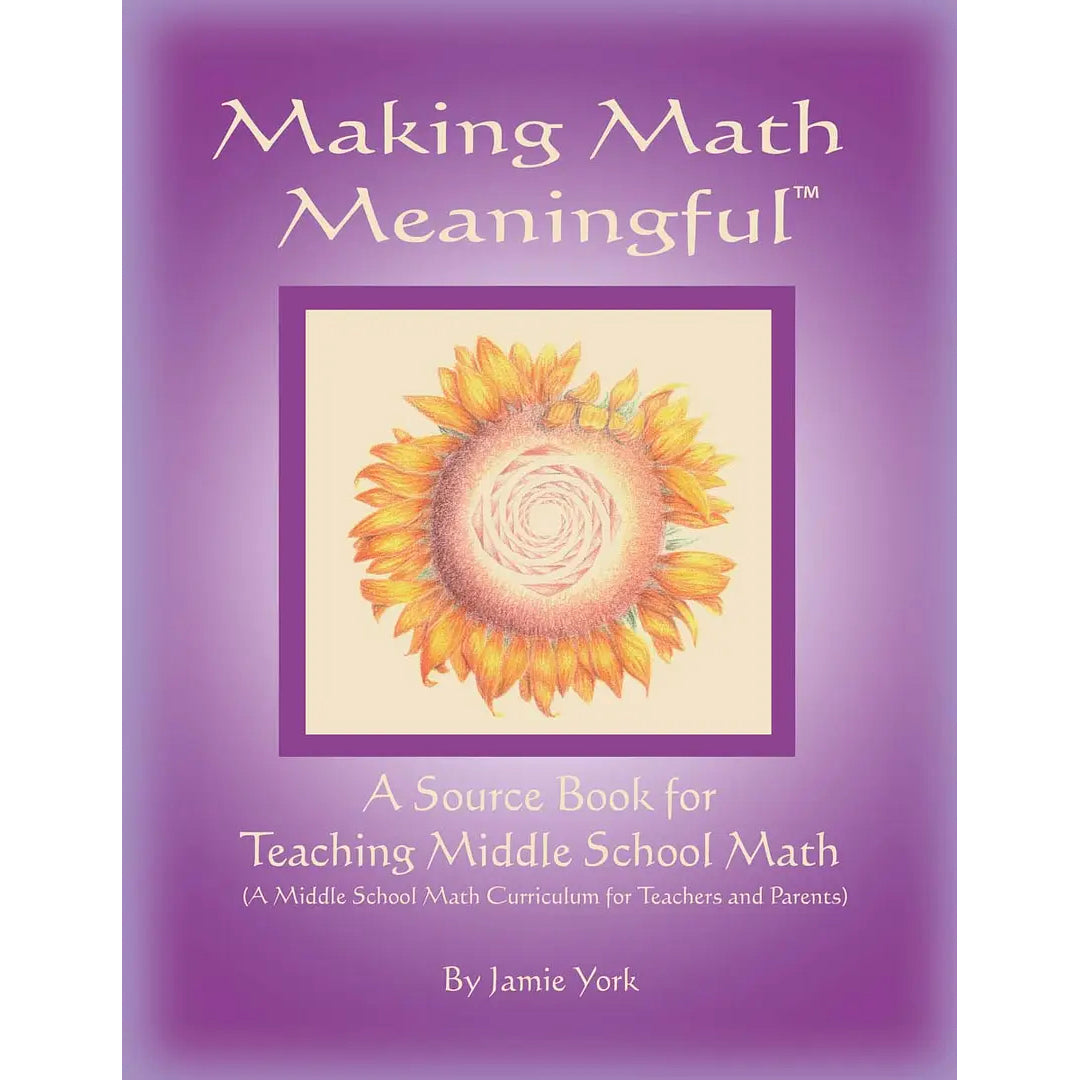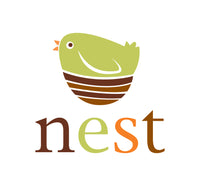
Making Math Meaningful: A Source Book for Teaching Middle School Math (Gr 6-8)
- Low stock - 1 item left
- Ships within 72 hours
by Jamie York
This book is both a curriculum guide for middle school math and a source book for great ideas that enrich any teacher’s math lessons.
Included in this Source Book for Middle School Math:
-
- A math curriculum guideline for grades 6-8.
- An essential resource for use with our grades 6-8 workbooks.
- Contains explanations of all concepts found in the workbooks.
- Ideas for all of the Waldorf math “main lessons” in grades 6-8.
- Includes an 11-page Introduction for the Teacher.
Who can use this book? Most of the author’s teaching experience is within the Waldorf school system. Yet this source book can be effectively used by any teacher or homeschooling parent who wishes to teach meaningful, age-appropriate math. The explanations in this book are also useful for parents (or tutors) who are helping their children in a math class that uses the curriculum laid out in this book.
Why this curriculum? When I started teaching at a Waldorf school, I was surprised to find that there were no textbooks. I was expected to create my own materials. This newfound freedom was both exciting and daunting. I proceeded to research what was happening at other Waldorf schools regarding math curriculum. I spent a great deal of time creating my own worksheets. My original question (“What should I teach?”) was soon transformed into, “What topics would best help in developing the thinking and imagination of my middle school students?”
This book is intended to share with others what I have discovered and developed during this journey.
While most of the material is not overly difficult, much of it is foreign, even for math majors. In writing this book, I have assumed that the reader may be weak in math. I hope that with some effort, even the most difficult topic is understandable.
A teacher’s guide for middle school math, including:
The challenge of teaching math today
Practical advice and thoughts on teaching math
How can we ensure that our students are prepared for high school and beyond?
6th Grade topics: Fractions • decimals • percents • mental math and math tricks
divisibility • casting out nines • exponents and roots • prime factorization
converting repeating decimals to fractions • and more.
7th Grade topics: The metric system • percents • rates • ratios • irrational numbers • the square root algorithm • basic geometry • and more.
8th Grade topics: Pythagorean Theorem, exponential growth, proportions, area and volume, dimensional analysis (unit conversions), basic algebra skills, and more.
Detailed explanations of main lessons and less well-known topics, including:
Business math • The golden ratio • Number bases
Exchange rates • The Fibonacci sequence • Binary and ASCII code
Mental math & math tricks • Gauss’s summation formula • Computer algorithms
Converting repeating decimals • Angle theorems & proofs • Archimedes’ ratio
Geometric drawing • The four ratios of π • Platonic solids
Euclidean constructions • The square root algorithm
…and much more!
You should also consider signing up for…
Our Grade-Specific Online Workshop: The Art of Teaching 6th Grade Math
Our Grade-Specific Online Workshop: The Art of Teaching 7th Grade Math
Our Grade-Specific Online Workshop: The Art of Teaching 8th Grade Math
Teachers’ Reviews of: A Source Book for Teaching Middle School Math:
I’ve been teaching many grade levels K-8 over the last ten years in mainstream education (five in Waldorf education) and have had my hands on many math curricula that were adequate in teaching the basic concepts in the different mathematical strands. But I always found that the programs were lacking in creating lasting understanding, enthusiasm and confidence with numbers. I began working with Making Math Meaningful in my fifth grade classroom at Madrone Trail Public Waldorf school in Oregon, and my students and I became so interested in what they might find out about how numbers worked! This carried into the junior high years, where many student who don’t have a natural affinity for numbers often become discouraged and uninterested in math. Through daily practice with the Making Math Meaningful’s workbooks, my students developed an amazing fluency and knack for the nature of numbers. !00% of the my students have met their math benchmarks for our state in 6th and 7th grade. This is only one measure of the efficacy of a math program. Through using this curriculum, my students are more creative in their problem solving and critical thinking, have cultivated good work habits and have come to find that each of them are able to learn the magic of mathematics. Most importantly perhaps, all of my students, regardless of ability, have come face to face with math problems that have challenged them to work and rework until a solution is found, and it is this skill that has helped prepare a group of 8th graders who will begin high school with a strong knowledge of self. They have developed a set of characteristics that will help them push forward when they’re in doubt and start working through an issue that seems to have no solution in sight. Jamie York has managed to prepare a math curriculum that supports the development of the whole child. It can be used by main stream public educators as well as in the Waldorf middle school math classroom, and it has become the must-have element of our school’s very successful math program.
— Alyssum Barber, Madrone Trail Waldorf Charter School, OR, USA
I am just completing my third Waldorf class teaching cycle and have used the Making Math Meaningful curriculum guides and workbooks for this cycle. My present eighth graders have mathematical thinking skills and basic arithmetic skills that surpass my former two classes. The grades six, seven, eight workbooks are challenging for me as a class teacher and definitely for my students, but it is a delight to experience the students’ enthusiasm when they “get it” with a new concept or remember a solution method from a previous year. I taught using more main stream math textbooks in my previous classes and, while my students went on to be solid high school and college math students, they did not show the level of creative and confident mathematical problem solving that my present class has. As an experienced Waldorf math teacher, Jamie York shows a deep understanding of when and how to introduce age-appropriate material and leads the teacher through the introduction of the pedagogical basis of each theme. He avoids the possible over-emphasis on teaching students math procedural skills and encourages teaching slowly and thoroughly so that students deeply absorb the material. And by helping a math or class teacher show how math is a fascinating, creative, yet quite achievable endeavor, Mr. York has helped me develop students who are on the path to becoming imaginative, analytical thinkers in high school.
— Nancy Pierce, Portland, OR, USA
I’m a 6th Grade Teacher and my students worked with your workbook this year, and I took many inspirations from your Middle School Curriculum Guide. I just wanted to let you know what a fabulous, positive experience it was. I think I found myself in that “difficult middle school spot” that teachers can get into. Parents wonder if what the class teacher offers is “enough” and how they will ever “learn” to use worksheets and such. My students have always been enthusiastic mathematicians. They loved working with the book, which we completed and are reviewing now during the past few weeks of school. I’m looking forward to using your workbooks for 7th grade as well.
— Claudia Thomas, Richmond, VA, USA
Softcover, 192 pages. 11 x 8.5".
Published by Jamie York Press.
Printed in the United States.
About the Author
Jamie York is a Steiner-Waldorf maths teacher and consultant, and creator of the Making Maths Meaningful programme. Born in Maine, he has taught maths at Shining Mountain Waldorf School in Boulder, Colorado for over twenty years. He consults for a variety of schools in the USA and internationally, and serves on the faculty at the Centre for Anthroposophy in Wilton, New Hampshire, training Waldorf high school maths teachers.

